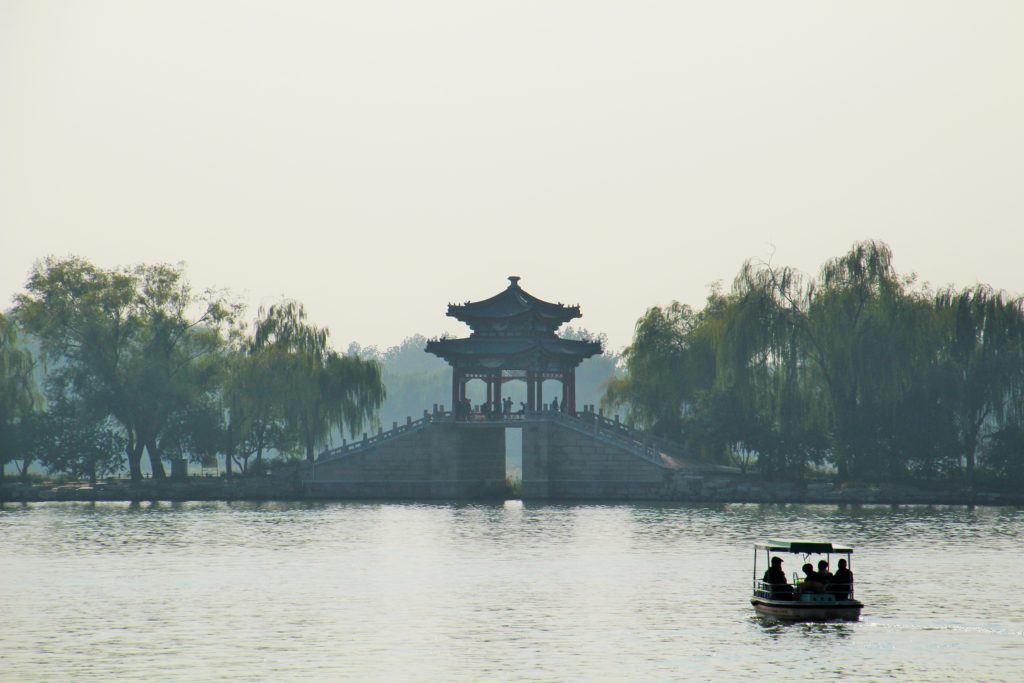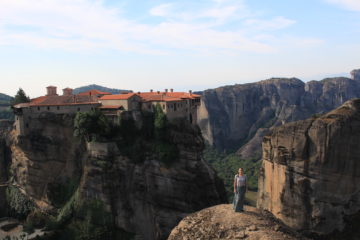We somehow managed to survive our first week in China, all of which was spent in Beijing. In some respects it was exactly as difficult as we expected it would be, but in others it was way more difficult. Amidst the struggles and triumphs of our first week, we developed several impressions of our time in China. The difficulty is parsing the signal (what is unique to Beijing) from the noise (what is just very Chinese about the whole experience), so it’s hard to differentiate the two. Once we explore more parts of China, we should have a broader sense of things.
With that said, below is a list of things that stood out to us during our first week:
- Fairly reasonable prices. Given that Beijing is a massive and well-developed city, we expected it to be one of the most expensive places in the first few months of our travels. While this is still probably true, we have been pleasantly surprised by how generally affordable everything has been.
- Dinner at local restaurants has run us about $10 total for an evening.
- Beers are $1.50 each. They’re kinda crappy, but still super cheap! [Editor’s Note: I happen to like Chinese beers. They’re similar to the types of beer I like to drink normally, which is to say light, crisp, and easy to drink. These happen to be aspects of beer Rorie dislikes.]
- The subway costs between $0.50 and $1 for each ride (depending on the distance travelled), which is crazy affordable.
- Admittance to public attractions hasn’t been exorbitant like at some places I’ve travelled, which is a relief.
- Even the cab rides have been affordable, coming to no more than $15 (which was a 45 minute ride from the airport to our hostel, which is way further than normal).
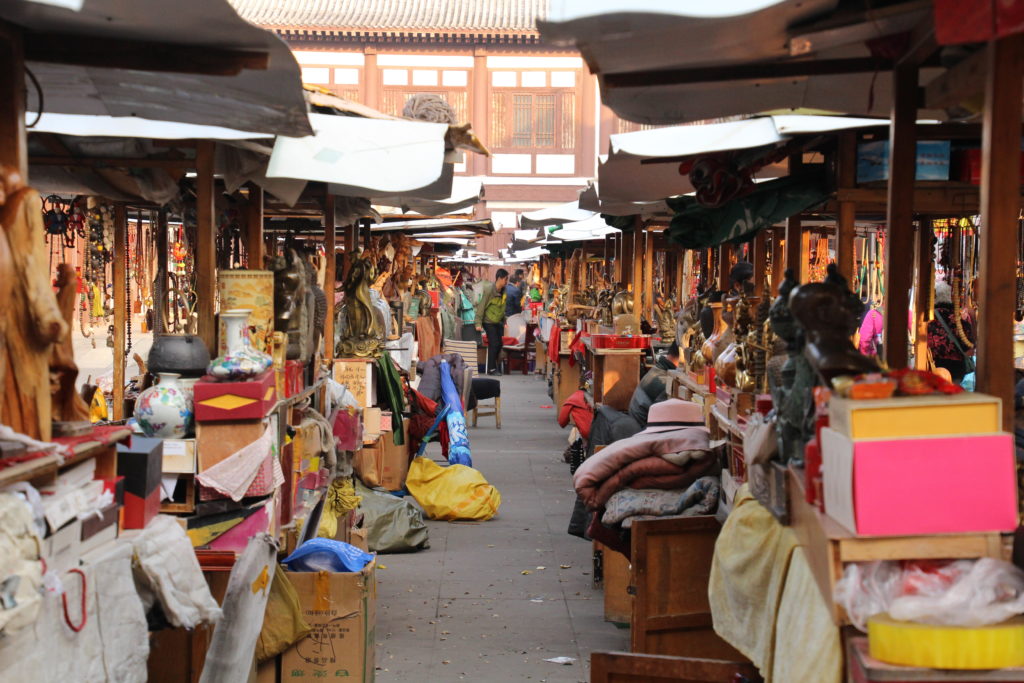
A row of street stalls selling all kinds of cheap (if you haggle) souvenirs and trinkets
- Massive city, but exceptional subway. As mentioned before, walking around Beijing is sorta hellish since it’s such a big city. Fortunately, the subway more than makes up for this by being extremely extensive, super affordable and delightfully easy to navigate. The announcements and signs are in both Chinese and English. The stations are impeccably clean, well lit/labelled and safe (e.g., there are military sentries stationed at each entrance and every person entering a subway station has to put their belongings through an x-ray machine and have their water bottles tested, weirdly enough). It’s better than NYC’s subway in every way. That’s a fact.
- Beijingers are like NYCers. I guess this shouldn’t be surprising since big cities breed a certain mindset, but it sorta is. I would characterize Beijingers as not being very nice, but also not being overly rude unless they’re prompted. They’ll screw over a tourist or situation if possible (see, e.g., the taxi driver near the Silk Market that tried to markup his fares by 500% before we cursed him out and jumped out of the cab), but tend to just be minding their own business. They’re generally aloof and in their own world, craving anonymity amongst the hordes and providing the same.
- We might as well not exist. Speaking of anonymity, it’s like we’re freaking invisible here. It’s pretty great. In most cities the westerners (read: white folks) are targeted by vendors and other folks, peppered nonstop with requests to spend their money in some irresponsible way. But in Beijing, that hasn’t been the case at all. Vendors exclusively target locals and basically ignore us, probably because the language barrier is more trouble than it’s worth and we’re the minority. In fact, this extends to security checks – locals are patted down and scrutinized fiercely, but they basically just let us walk through like we own the place. It was a dream. [Editor’s note: while we have been largely ignored by vendors and security guards, there have been a few moments where locals have asked to take pictures with us because we stand out so much (see second picture below, and the next bullet point).]
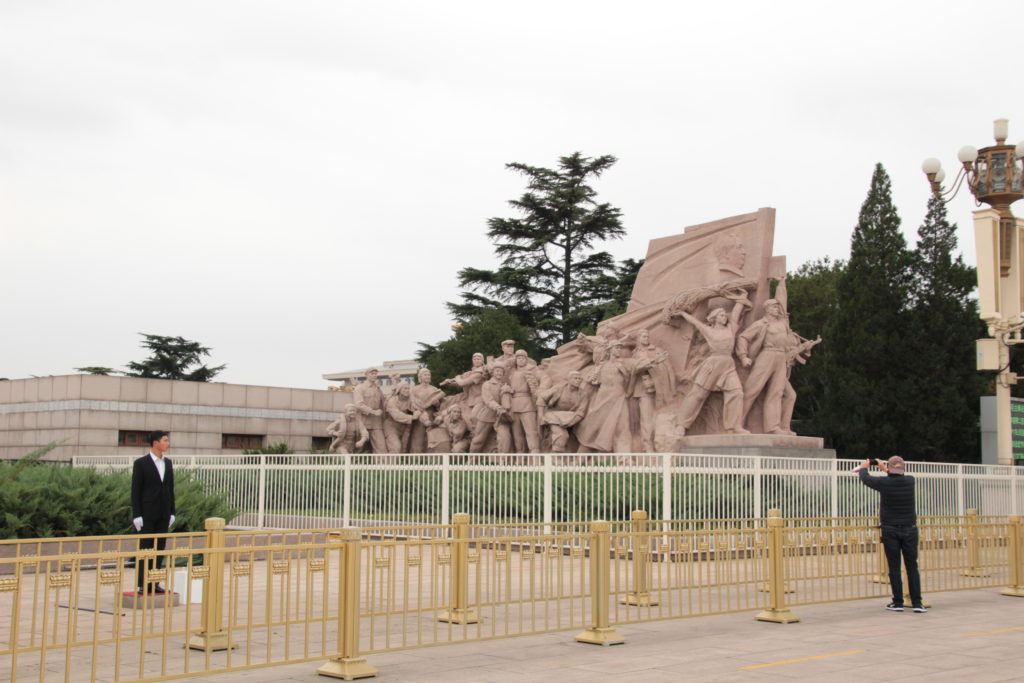
A guard watches Rorie take a picture in Tiananmen Square (which was free to enter!)
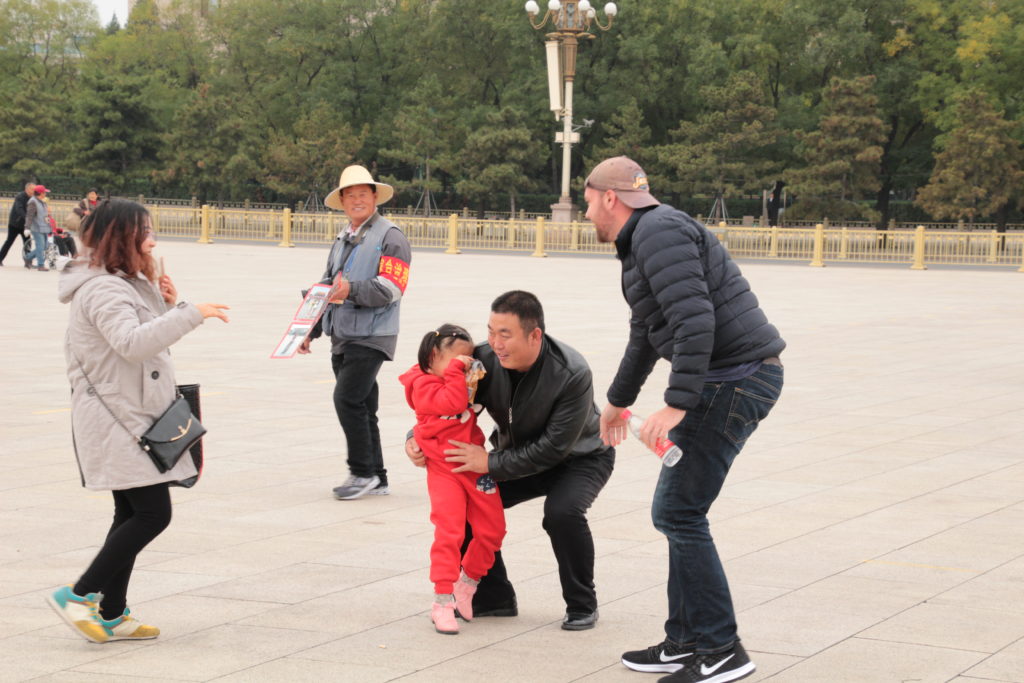
After this child’s mother motioned for Rorie to come close for a picture with her daughter, the young girl burst into tears in fear at the sight of him. Clearly not used to large white men.
- Surprising dearth of tourists. As mentioned, one source of the anonymity is that we (read: westerners) were vastly outnumbered at every tourist site in Beijing by Chinese folks. It makes sense at one level, since there are 1+ billion Chinese citizens, so it’s not hard for a handful of them to show up and overwhelm a destination. But that still doesn’t account for the absence of western tourists, which is mainly limited to large, organized tour groups of retirees. Why does nobody visit Beijing (and, presumably, China on the whole)? Are they intimidated by its difficulty and foreignness? Can anyone answer this for me?
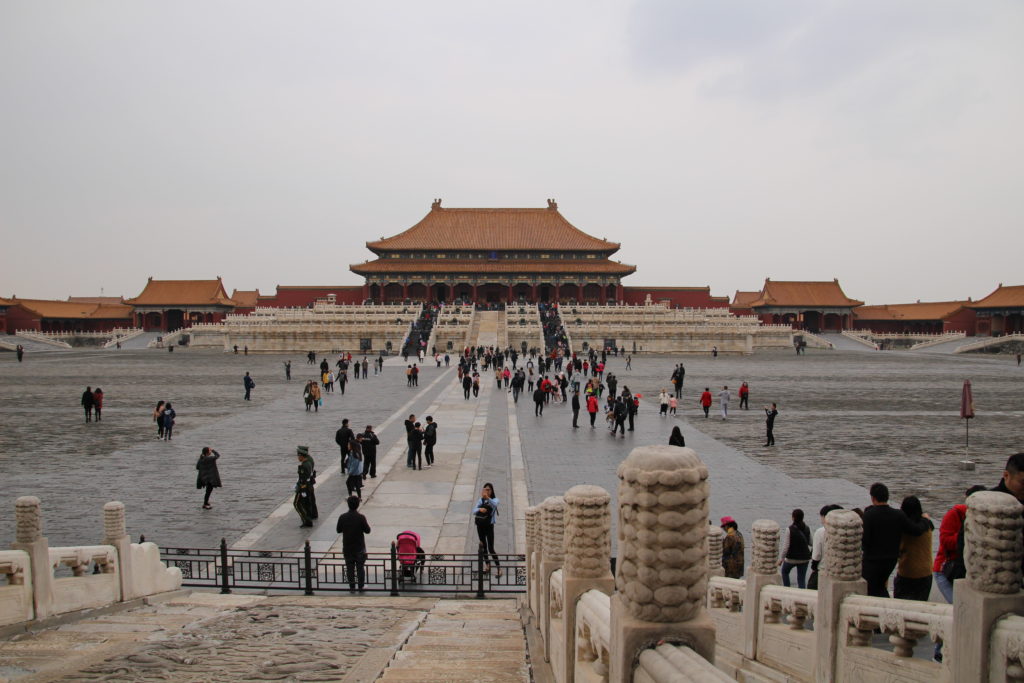
Lots of empty space and not as many tourists as we were expecting at the Forbidden City
- Excuse me, do you speak English? People warned us that English wasn’t very widespread, but we figured they were just exaggerating. I mean, Beijing is a massive city, so surely the young people would speak English, right? Painfully wrong. It’s more shocking when people know a few English words than when they don’t, which is abnormal for most cities we’ve travelled in. While it hasn’t helped our Chinese language skills (I know a whopping 4 words right now), it has really unlocked a set of pantomime skills that neither of us knew we possessed (e.g., Try to imagine how many times I’ve acted out putting deodorant on when shopping for the product. Whatever number you guessed is wrong. Too low. I’ve used this move on half of Beijing with basically zero success. Why doesn’t China believe in deodorant?!)
- Food is ridiculously delicious and varied. We read a bunch of blogs about China before coming here and their sentiments of the local cuisine were wildly disparate, but mostly leaned towards Chinese food not being good. I will never understand this. Holy hell, we’ve eaten like kings here! The food is super interesting, incorporating vegetables, spices and tofu in ways that most other places haven’t mastered. It’s also a culture that fully embraces the “family style” meal, which is glorious. Some highlights were:
- A Sichuan-style “hot pot” meal where you get a large bowl of boiling oil and use it to cook the meats and vegetables you order. It was magnificent.
- Seemingly all potato dishes are way better here than anywhere else. They really elevate this basic starch by being inventive with the thickness of the pieces, the spices used and the presentation. A personal favorite involved thinly sliced potatoes and chunks of raw onion mixed in a spicy concoction, brought to our table in a bowl with a burner under it so it would cook/be hot throughout our meal.
- Mutton that has been rubbed in cumin and coriander. Had a really interesting, nice set of flavors to it.
- Fried green beans that are cooked with chunks of pepper flakes. The dish is a staple here and works nicely because it isn’t oily at all, is fairly healthy (all things considered) and has nice spiciness.
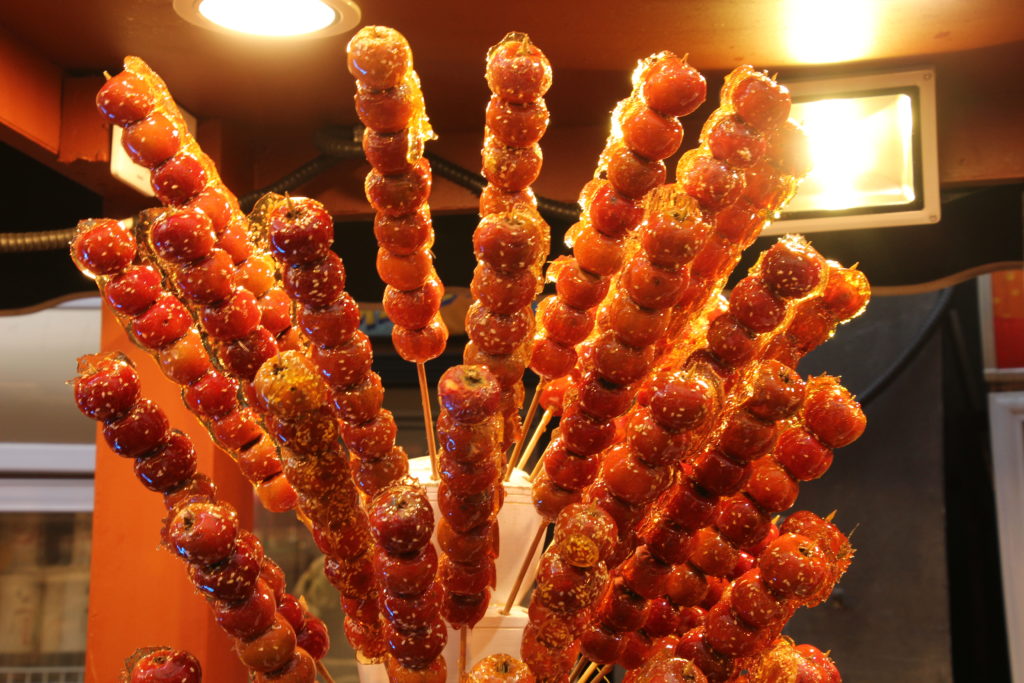
Fruit on skewers coated in a sugary glaze. These are hawthornes, I’m pretty sure. They have small pits and a texture almost like a potato, but fruitier.
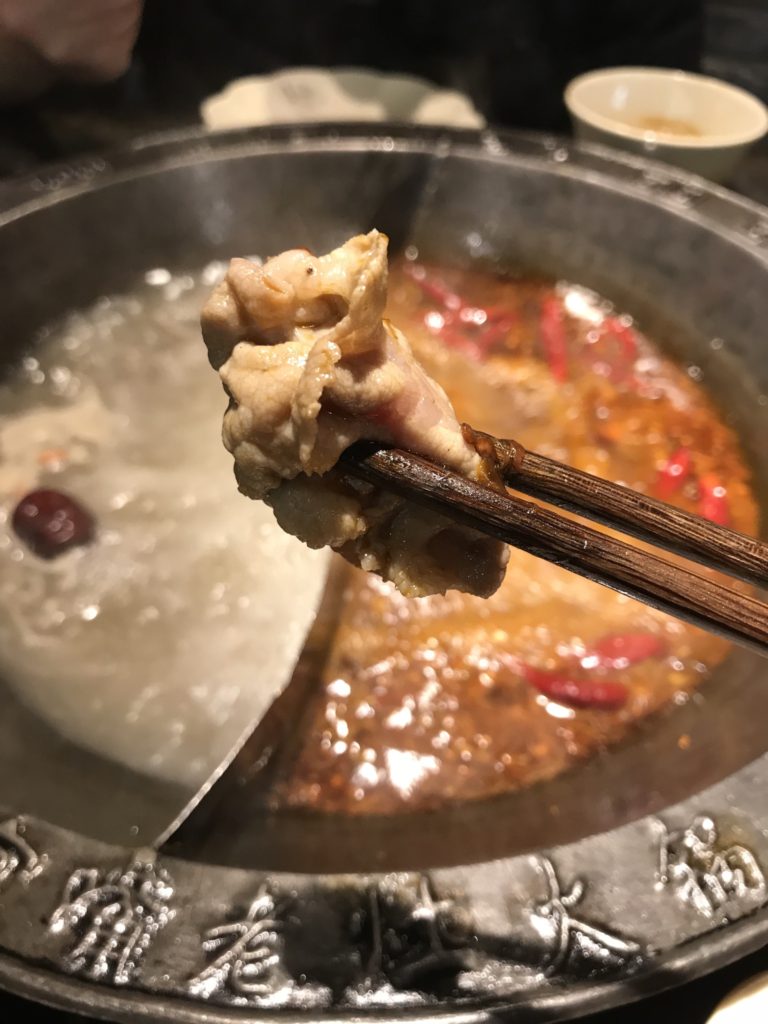
Cooking our own meat in our spicy hotpot for lunch
- Perpetually subpar weather. It’s possible that this is a byproduct of the time of year we’re here, but c’mon. Beijing seems to be just a chronically dreary place. [Editor’s note: I read that summer is too hot and winter is too cold, so September and October are actually the *best* times to visit, making this dreariness even more surprising.] Most days are overcast and slightly/mostly rainy, which just sucks. On the rare days when the sun makes a valiant effort to shine on this city, its efforts are stifled by the omnipresent smog hovering overhead. This means that even on its best days, the weather in Beijing just seems to be meh. Trust me, this weather can really get to you after a while. It has totally shaped the tone of our trip and our respective moods, so we’re glad to be moving on to greener/less smoggy pastures from here!
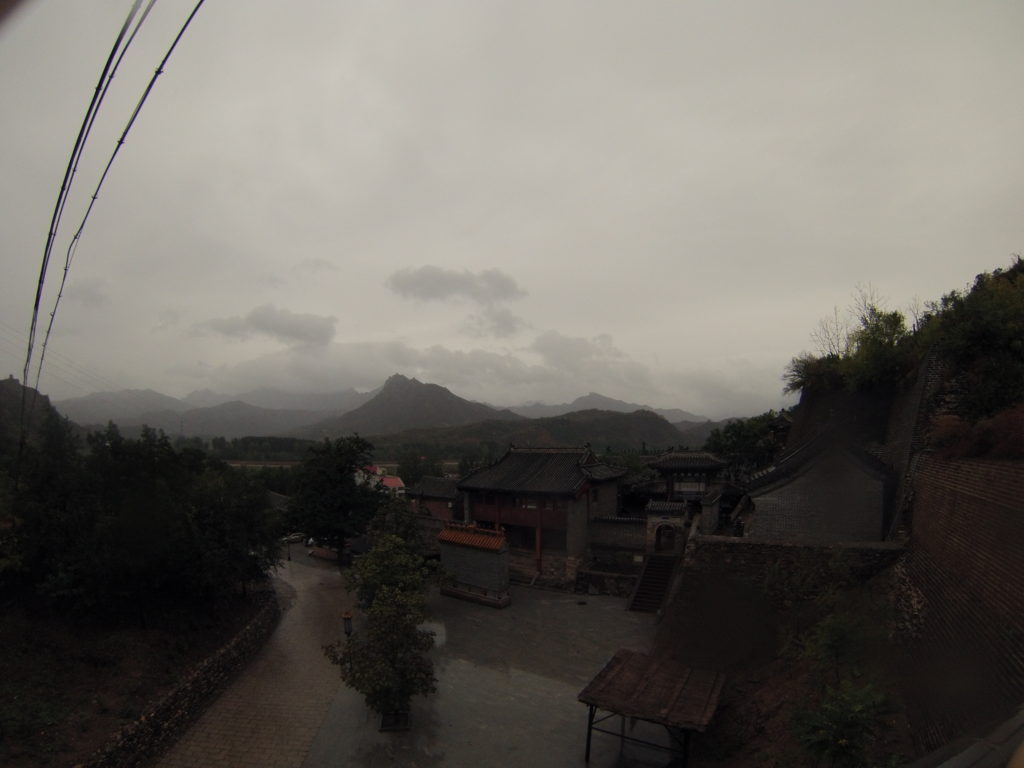
Gray and wet (and this is well outside the city). Meh.
- Impressively ornate architecture. Say what you will about the Chinese, but they are damn good at two forms of building: on a large scale (e.g., the Great Wall of China) and with incredible craftsmanship (e.g., ceiling carvings and ornate roof lines at the Temple of Heaven and Summer Palace). The large public works in Beijing are very well done – the roads are well maintained and sizable, the subway is excellent and there are countless gigantic buildings in great condition. Additionally, their exceptional craftsmanship and attention to detail is apparent in both their large temples, as well as some of the goods that were sold at the Antique Market.
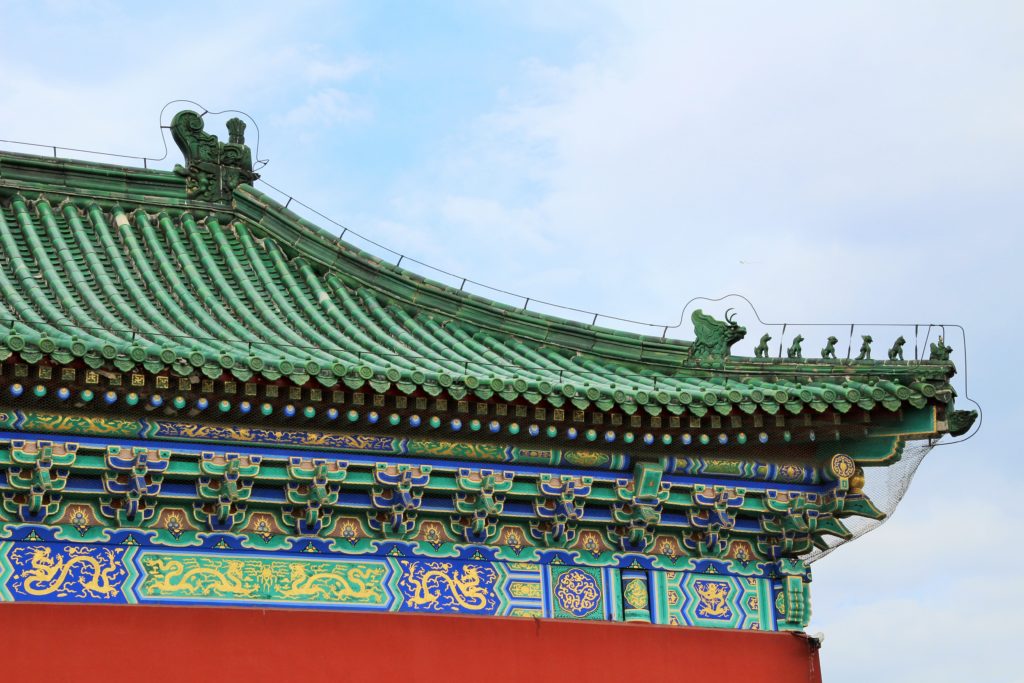
Incredible roof decoration at the Forbidden City
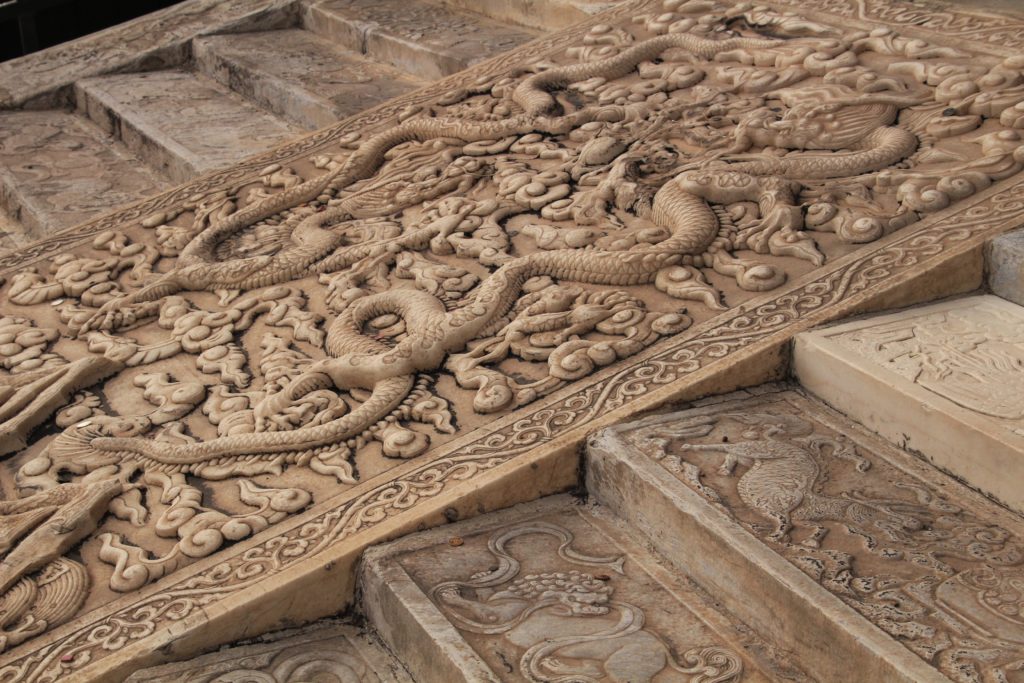
I absolutely love these stone carvings on the stairways at the Forbidden City
- Shocking levels of cleanliness. Beijing rivals Disneyland in that there is a surprising dearth of trash on the ground and, if there is any at all, it means there’s probably a city worker in an orange jumpsuit driving a one-man tuk-tuk with a container on the back to pick it up and throw it away. NYC can learn a lot from this kind of conduct! Beyond the extremely clean streets, there are also (free!) public toilets scattered throughout Beijing which are kept surprisingly clean and serviceable. [Editor’s note: I imagine this description has to do with Rorie being a male. The public bathrooms are not ideal.] I suspect China has a hugely inflated state payroll full of government workers, but no complaint on this end – they produce a damn clean city. [Editor’s note: I’d characterize it more as “tidiness” rather than “cleanliness”. Fallen leaves and pieces of trash are immediately picked up, and every tree and flowerpot is immaculately groomed, but I don’t really feel that many areas are “clean” in the “lack of germs” sense. Semantics, perhaps, and certainly not something New York or any other big city has mastered either.]
- Spitting. Ewww. Seemingly in an attempt to mitigate all the cleaning that the government workers are doing, Beijingers (and I suspect Chinese folks as a whole) are constantly spitting. It happens everywhere and there really don’t seem to be any boundaries for when it ceases to be socially acceptable. It takes a lot to get used to this. Also, it never ceases to be disgusting. Ever.
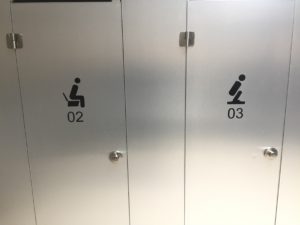
When we even have the option, it’s a good day.
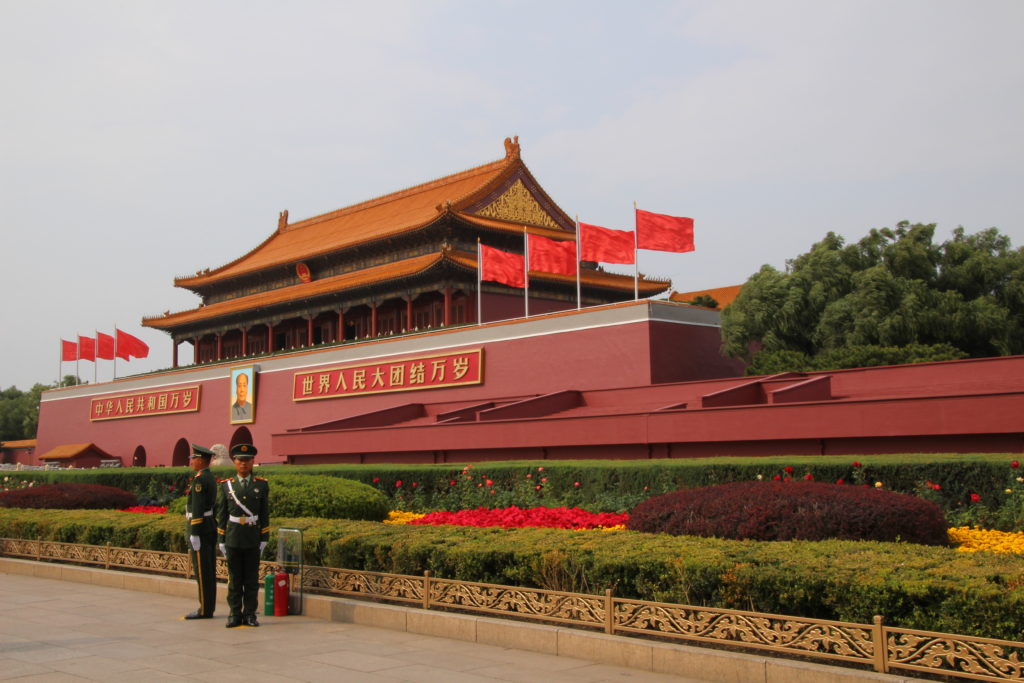
Impeccably groomed landscaping and guards at Tiananmen Square
And now, we leave you with a moment of serenity from the Summer Palace.
